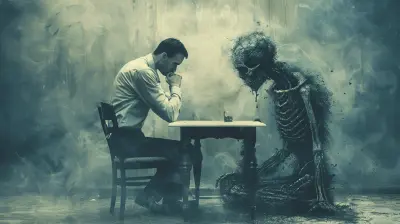How to Recognize the Signs of Emotional Dependency in Yourself
7 August 2025
Let’s be honest — emotional dependency isn’t a fun thing to think about, let alone admit to ourselves. But here’s the truth: recognizing it is the first step toward emotional freedom.
You might have heard the term tossed around in conversations or maybe even read about it in passing. But what does emotional dependency really mean? How do you know if it’s something you’re experiencing? And is it really that big of a deal?
Short answer? Yes. But don’t worry — this article is here to help you understand what emotional dependency looks like, how it sneaks into your life, and most importantly, how you can take back your emotional power.
Let’s dive in.
What Is Emotional Dependency, Anyway?
Imagine you're holding a balloon, but someone else is holding the string — that’s emotional dependency in a nutshell.Emotional dependency happens when your sense of well-being, happiness, or identity relies too much on someone else. It could be a partner, friend, family member — even a boss. It’s like you’re giving someone the remote control to your emotions. When they’re happy, you’re happy. When they pull away, your world crumbles.
Sound familiar?
This isn’t the same as loving someone or needing support now and then — we’re human, after all. Everyone leans on others sometimes. But when your emotional state constantly hangs in the balance of someone’s behavior or mood, that’s when it becomes a problem.
Why Is Emotional Dependency So Hard to Spot?
It’s sneaky. Emotional dependency often disguises itself as love, loyalty, or deep connection. And because society tends to romanticize self-sacrifice — especially in relationships — many of us confuse this dependency for devotion.Add to that the fact we crave connection (we’re wired for it!), and it's easy to lose ourselves in someone else.
Here’s the kicker: You may not notice you’re emotionally dependent until something shakes you — a breakup, a friend pulling away, or even a job loss. That’s when the emotional world you've built around someone else starts to unravel.
But guess what? That unraveling, as painful as it is, can also be the beginning of true healing.
Common Signs of Emotional Dependency — Are You Experiencing These?
So, how can you tell if you might be emotionally dependent? Here’s a breakdown of the most common signs. Be honest with yourself as you read through them — there’s no judgment here.1. You Constantly Seek Reassurance
Do you find yourself asking for validation over and over? Maybe you need to hear “I love you” multiple times a day just to feel secure. Or you’re always worried someone’s mad at you, even when there’s no evidence.That endless need for comfort stems from insecurity — and when external validation becomes your lifeline, that’s emotional dependency waving its red flag.
2. Your Mood Swings With Their Approval
When they’re sweet, loving, or affectionate — you're on top of the world. But if they’re distant, distracted, or critical? You're devastated.If your emotional state is a rollercoaster that depends entirely on someone else’s actions or words, it’s time to check in with yourself.
3. You Fear Being Alone... Like, Really Fear It
Emotional dependency makes solitude feel unbearable. Whether it’s a few days or just an afternoon, being without them makes you anxious or restless.You might fill every empty space with texts, calls, or plans to avoid being by yourself. But being alone shouldn’t feel like punishment. It should be a time to reconnect with you.
4. You Sacrifice Your Needs to Keep the Peace
You don’t speak up when something bothers you. You go along with what they want — even when it’s not right for you. Why? Because you're terrified of conflict or rejection.This pattern often stems from a deep need to be accepted, no matter the cost — and that’s emotional reliance taking the wheel.
5. You Feel Lost Without Their Guidance or Opinions
If you can’t make simple decisions without checking in with them, or if you often doubt your own judgment, take notice.Healthy relationships involve support — but not dependency. Trusting yourself is crucial for emotional independence.
6. You Fear They’ll Leave — Even Without a Reason
That constant fear that they’ll find someone better, get bored, or walk away… even when there’s no sign of it? It’s exhausting. And it often results in clinging behavior or overcompensating — both of which push people away, ironically.
Where Does Emotional Dependency Come From?
This didn’t happen overnight. Emotional dependency is usually rooted in earlier life experiences. Understanding where it started can help you unravel it.Childhood Experiences
Did you grow up feeling unseen, unloved, or only conditionally accepted? Maybe love and approval came with strings attached — or were absent altogether. If so, emotional dependency becomes a strategy to chase the connection you didn’t get back then.Past Relationships
Toxic or emotionally unavailable partners can condition you to seek constant reassurance. If you’ve been ghosted, cheated on, or manipulated, it can create a fear-based attachment that follows you into future relationships.Low Self-Esteem
When you don't believe you're enough as you are, you’ll look for someone to "complete" you. But here's the truth: you’re already whole. It’s just easy to forget that when you’re used to looking outward for worth.Why Emotional Dependency Hurts More Than Helps
On the surface, emotional dependency might feel like love or connection. But here’s what it’s really doing:- It robs you of your identity — You forget who you are outside of the relationship.
- It puts pressure on others — No one wants to feel solely responsible for someone else's happiness.
- It breeds resentment — Over time, both parties feel trapped or suffocated.
- It keeps you stuck — You might endure mistreatment or dysfunction just to avoid being alone.
And most importantly, it creates fragile relationships. Because anything built on fear instead of love isn't solid ground.
How to Break Free and Reclaim Emotional Independence
Here’s the uplifting part: emotional dependency is not a life sentence. You can absolutely shift from clinging to connecting — in a healthy, empowered way.Here’s how to start:
1. Start Building Self-Awareness
The fact that you’re reading this article means you’re already on the right track. Begin to notice your thoughts, patterns, and behaviors. Which ones stem from fear? From insecurity? From a need to control?Journaling can help you uncover what’s going on beneath the surface.
2. Strengthen Your Relationship With Yourself
This isn’t just about self-care bubble baths (though they’re nice, too). It’s about reconnecting with your interests, goals, and values.What makes you feel alive when no one’s around? What do you enjoy doing — just for you?
The more you cultivate your own identity, the less you'll need to define yourself through someone else.
3. Practice Healthy Boundaries
Boundaries aren’t walls — they’re bridges to healthy connection. Start saying no when something doesn't sit right. Speak up when your needs matter. Respect your own space and allow others to have theirs, too.It might feel uncomfortable at first, but over time you'll feel more confident and secure.
4. Challenge Your Thoughts
Your mind might tell you things like, “If they leave, I won’t survive” or “I’m nothing without them.” These are just stories — not facts.Replace those anxious narratives with empowering truths: "I can take care of myself." "I am whole on my own." "My worth isn’t defined by someone else’s presence."
Rewriting your inner dialogue is a powerful way to reclaim emotional autonomy.
5. Embrace Solitude
Alone time is your ally, not something to be feared. Use it to get comfortable in your own skin. Read, reflect, travel solo, or try new hobbies.Solitude strengthens self-trust — and that’s the foundation of emotional independence.
6. Seek Therapy or Support Groups
Sometimes, emotional dependency runs deep, and it helps to have guidance. A therapist can support you in healing from childhood wounds or unhealthy patterns.You don’t have to do this alone — and asking for help is a sign of strength, not weakness.
Real Talk: What Emotional Independence Looks Like
Let’s get inspired for a second. Emotional independence doesn’t mean cutting off emotions or becoming cold. It means:- You love deeply but don’t lose yourself in love.
- You can be alone without feeling lonely.
- You respect others’ freedom and honor your own.
- You make decisions based on your truth, not fear of disapproval.
- You know that your happiness starts — and stays — with you.
Doesn’t that sound freeing?
Final Thoughts
Emotional dependency can feel like a heavy cloud hanging over your self-worth. But clarity is your first ray of sunshine. Now that you’ve learned how to recognize the signs of emotional dependency, you’re empowered to shift away from it, step-by-step.No, it’s not always easy. Inner work rarely is. But every step you take toward emotional independence is a step toward healthier relationships — including the one you have with yourself.
Take the reins. Hold your own emotional balloon string. You’ve got this.
all images in this post were generated using AI tools
Category:
Emotional DependencyAuthor:

Gloria McVicar
Discussion
rate this article
1 comments
Fatima McConkey
This article offers valuable insights into recognizing emotional dependency. Acknowledging these signs is the first step towards healthier relationships and personal growth. Embrace this journey—self-awareness is a powerful catalyst for change!
September 5, 2025 at 3:21 PM

Gloria McVicar
Thank you for your thoughtful comment! I’m glad you found the insights valuable. Embracing self-awareness is indeed crucial for personal growth and healthier relationships!


